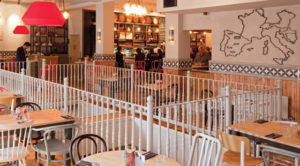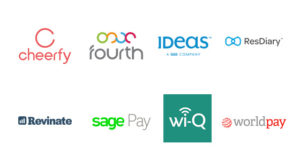Saving money by using a procurement services provider
A good procurement services provider will ensure you're getting the best possible price when buying products, and help you build relationships with your suppliers. David Harris reports
Buying the right products at the right price is crucial to all businesses. Hospitality is no exception and food and drink is one of the obvious examples. In principle it doesn't matter if you are buying caviar or carrots, Champagne or Coca-Cola; getting the best price matters. What all operators need is the product they want at a price that allows them to make a profit.
If the fundamentals of buying and selling are constant, the way to make the most of your purchasing power has changed radically, thanks to computers. Skilful buyers and book-keepers might still be important but they have a lot more in their armoury nowadays, including sophisticated computer software.
For those that want more time on running their business as opposed to buying for it, both the computing power and the expertise to analyse it can be done by others. The companies that offer procurement services work by organising the relationships between customers and their suppliers, often using their own specially developed computer systems. The aim is to save not just money, but time.
A good example is Pelican Procurement, which acts for a range of hospitality customers, including City Lodge hotel group, Swire Hotels, the Great Little Pub Company and Baxters restaurants.
Matt Ferris, system manager at Pelican, works with Pi, the company's name for its specially developed procurement software program. He says the first thing an operator should do is to examine what they are doing at that moment. This means looking at what they are buying, who they are buying it from and how the ordering and delivery process occurs. One of the first revealing things that can happen with some companies is that management is unsure about these apparently basic questions.
Ferris says: "Some managers don't know the detail of what they are buying or how the process works, partly because it varies in different parts of the business or on different sites."
Not surprisingly in such circumstances, one of the first money-saving steps that can be taken is to consolidate buying so that better deals can be negotiated. This might include a formal tender process so that buyers can get the right balance of service, quality and price. It can also provide good market comparisons as it organises purchasing from enough suppliers to know the typical price for most of what its clients want to buy. This makes overpaying less likely because it is able to police over-pricing with better information.
But it is after the formal tendering process has been completed that Ferris believes a good procurement systems company really starts to demonstrate benefits. What procurement firms do is build a relationship with the suppliers as well as with the client. They receive all invoices electronically and consolidate them. They can be checked by the customer as well as by the procurement firm, which will then pay the invoices on the customer's behalf, acting as their agent.
There are a number of things that these systems routinely do. One is to tell the customer what they are spending their money on. Another is to check the invoice against the contract that has been signed. It is surprisingly common for an invoice price to be higher than the agreed one, mistakes which often go unnoticed unless there is a proper checking system in place. Ferris says that making sure the correct amount is on all invoices can save 3% of total spend on food and drink.
Computerised systems can also identify products that are ordered but are outside the standard contract list. Chefs often want to order special ingredients, and it is always worth asking whether a good price for the extra items should be negotiated, particularly if they are to be ordered repeatedly.
Stock management is another area where procurement services can help. It is all very well buying something and having it delivered, but it is useful to know exactly where it is. In the fridge? The storeroom? The cellar?
Another advantage to stock management is that it can give you a stock valuation at any point, crucial to working out your gross profit.
"The point is they can see how much they are making every time they sell that particular product," says Ferris.
How much money do they all save? Well, it depends on how efficient they were before adopting specialist procurement help. Nevertheless, Ferris says Pelican's figures suggest it can drive costs down by 10%-15%.
How much do you have to pay to get the chance to get such savings? Well, the good news is that your investment is in time rather than money. It does take effort to adopt a new purchasing strategy but most procurement specialists get their fee from the suppliers. The amount varies but it is generally about 2%. Suppliers tend to be happy to pay it because they know they are likely to get more business with more operators by working with the procurement provider. Quid pro quo.
Most procurement service providers take their fee in this way and operate in a similar fashion, but that doesn't mean that they are all the same, even the ones that specialise in helping hospitality operators.
One difference is that some procurement providers are bigger than others. Foodbuy, one of the newest names, is also one of the largest. It was launched by Compass in the wake of its purchase of Acquire. While Acquire looked after £200m a year of spending for hospitality businesses, Foodbuy jumped to £1b annually after the injection of all the Compass Group business. It also has some prestigious clients, including Oxford and Cambridge Universities.
Andy Badger, who was MD of Acquire but is now chief information officer for Foodbuy, says that its clients use its technology for different but complementary reasons.
He says: "For some it is about saving money on the products because of our buying power; for others it is about saving time. A small group will also need fewer people working in their purchase ledger team if they use our services, so staff can be redeployed."
Investor interest in the procurement services sector has also increased in recent years. In 2015 Fourth, another of the big players in the UK, was effectively taken over when New York-based Insight Venture Partners acquired a majority shareholding. Fourth now has 1,100 customers worldwide and 400 staff.
Angela Hart, who is a solutions architect at Fourth, says the firm's systems are not just a help to groups but can also help smaller establishments. This is another advantage of computer programs - they can be adapted to suit all sorts of business.
Hart says: "Fourth's solutions are suitable for all sizes of business, ranging from small or medium to more complex enterprise-type organisations. The solution is highly configurable and can be tailored to meet more basic operations or those than run multi-branded and global."
Hart believes that moving to a specialist procurement solution system is something that most hospitality operators should embrace, but she adds that the adaptations needed can be challenging. She says: "It can be a major cultural change, particularly for a business which previously has not had systems in place. They need to get used to doing things a little differently."
And how should a hospitality company choose its procurement services provider? Hart advises operators to try and go for a provider that makes hospitality its commercial bread and butter, rather than a general procurement company.
Even this will leave you with a good number of possibilities, so in the end the choice of procurement provider is probably as personal as your taste in anything else. Even so, you should put them through a similar tender process to the one they will suggest for your food and drink suppliers. Look at what is out there, think about it, and make your choice. It could save you a lot of money.
10 ways procurement systems save time and money
- Lower the cost of your supplies
- Ensure you are not overcharged (invoice checking)
- Allow you to order all products online at one site
- Pay suppliers on your behalf at the agreed time and rate
- Check that the price you are paying for each product is not out of line with market rates
- Identify any products that seem to be bought for convenience rather than the best price
- Tell you immediately what you have in stock and therefore what you need to order and what you might be over-ordering
- Tell you where your stock is (cupboard, fridge, cellar)
- Give you an up-to-date stock valuation, crucial for working out gross profit
- Help you to accurately cost each dish you serve, for accurate profit margin assessment
How Fourth provided consolidation for CDG's brands
A clear way in which specialist procurement can help restaurateurs is by consolidation, especially where a group in which individual restaurants did their own buying sets up organised group procurement.
This is where Fourth proved so valuable to Casual Dining Group (CDG), formerly Tragus, which owns a string of leading brands including Bella Italia, Café Rouge, La Tasca, Las Iguanas and Belgo. John Bradshaw, CDG's head of commercial, said: "When we were Tragus we were a multiple-site group with no central directive, where different restaurants and different chefs were all doing their own thing."
When Fourth stepped in to help, CDG introduced the Starchef system, which offers a central database of ingredients so head chefs can see what is in the system and identify what they want.
Bradshaw says: "We had no central visibility of wastage or anything else. Once you get that visibility you can immediately identify any problems you might have."
Sometimes this can be something as simple as buying food in smaller pack sizes to avoid wastage.
Bradshaw says the Fourth systems allow CDG to monitor compliance to recipes in different sites, accurately control stock and properly analyse the financial consequences of purchasing decisions.
He adds: "It has enabled us to analyse our margins both overall and by brand and individual restaurants. It's been a very important development for us."
Sponsor's comment: Fourth
Fourth is the global leading provider of purchase-to-pay and inventory, workforce management and analytics solutions to the hospitality industry. In simple terms, its business systems help companies small and large to manage, control and optimise the many different functions and processes around people, food and beverages. They deliver transparency and enable companies to drive both revenue and profit.
Founded by restaurant entrepreneurs Derek and Edwina Lilley, and now backed by New York-based Insight Venture Partners, Fourth has supported the industry since 1999 and is continually seeking ways to improve this support through innovation. For any hospitality software need, the chances are Fourth 'has an app for that' from kitchen recipe management to allergen law compliance, and from labour scheduling and workforce management to productivity programmes, analytics and insight tools. Fourth has helped many operators go paperless AND eradicate millions of labour hours previously lost to manual data entry, through seamlessly integrated back-office systems.












